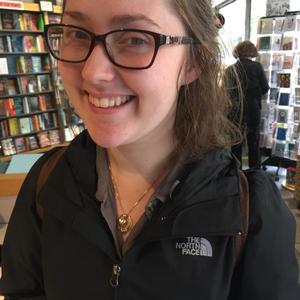Splash Biography
KATHRYN KOZEY, Aspiring Educator who loves Medical History
|
Major: HSHM/EDST College/Employer: Yale Year of Graduation: 2021 |

|
Brief Biographical Sketch:
Kathryn Kozey, a New Haven area native and member of Trumbull College’s Class of 2021, is majoring in the History of Science and Medicine. Using the knowledge she has learned from lectures and seminars, she aspires to design an integrative curriculum around cases of medical injustice and teach it at the high school level. Her hope is that this curriculum will inspire future generations to not only fully understand the nuances of medicine’s history but highlight its connection to every aspect of life. Prior to coming to Yale, Kathryn attended New Haven Academy, where she fell in love with the idea of teaching. New Haven Academy taught Kathryn how to be a socially just and active citizen by using materials designed by Facing History and Ourselves– an international non-profit that creates socially progressive history curriculums. After four years of working with these curriculums as a student, Kathryn even had the opportunity to intern at its New York Office during the summer after the first year at Yale. She continues to maintain great relationships with those she worked there and dreams of working for FHAO one day! Until then, she loves tutoring at New Haven Reads and teaching for Splash. Past Classes(Clicking a class title will bring you to the course's section of the corresponding course catalog)A4366: Intersex Activism in Splash Spring 2021 (Apr. 24, 2021)
In this two-part lesson, students will learn a brief overview of the history of eugenics and how to be an intersex activist. While participating, students will participate in group discussions and watching engages videos. Students will ultimately learn how the desire "to fix" intersex stems from this fraught and lengthy history of discrimination. Most importantly, they will learn Intersexuality is normal and how to be an Intersex Ally!
H4196: Intersex Activism in Splash Spring 2020 (Apr. 11, 2020)
In this two-part lesson, students will learn a brief overview of the history of eugenics and how to be an intersex activist. While participating, students will engage in variety of activities including: group discussions, close text analysis, and watching videos. Students will ultimately learn how the desire "to fix" intersex stems from this fraught and lengthy history of discrimination. Most importantly, they will learn Intersexuality is normal and how to be an Intersex Ally!
H3893: Television's Finest Doctors in Splash Fall 2019 (Nov. 16, 2019)
Is it History or is it Hollywood?
Participants will first analyze their own experiences as patients and consumers in medical media. In doing so, participants will partake in a gallery walk that consists of images of television’s most famous doctors. Then participants will then learn a brief history of the formalization of medical education. After this mini-lecture, participants will be asked to consider both the formalization's immediate and long-term consequences; and discuss whether or not this history has influenced the images of doctors they consume.
You decide!
E3791: Television's Finest Doctors in Sprout Fall 2019 (Sep. 28 - Oct. 12, 2019)
Is it History or is it Hollywood?
Participants will first analyze their own experiences as patients and consumers in medical media. In doing so, participants will partake in a gallery walk that consists of images of television’s most famous doctors. Then participants will then learn a brief history of the formalization of medical education. After this mini-lecture, participants will be asked to consider both the formalization's immediate and long-term consequences; and discuss whether or not this history has influenced the images of doctors they consume.
You decide!
H3675: Echoes of Eugenics: How the Overextension of Medical Jurisdiction Impacts Intersex Individuals in Splash Spring 19 (Apr. 06, 2019)
This course will allow students to:
-learn a brief overview of the history of eugenics.
-identify lingering aspects of eugenical ideals and recognize how they specifically impact the Intersex Community.
-explore and reflect upon their own biases towards groups of people of by exploring their universe of obligation.
-explore themes of social justice, activism, and upstanders.
H3689: Who’s Flexner and Why Does He Get a Say Medicine? : Images of Today’s Doctors & the Legacies of Medical Education Reform in the Progressive Era in Splash Spring 19 (Apr. 06, 2019)
Throughout the course of this lesson, I hope to inspire the students to consider how the modern media they consume shapes their perceptions of the medical system— specifically their racialized image of the doctor— and how these perceptions are connected to the histories of medical education’s reform during the Progressive Era.
The lesson, which is divided into two main parts, focuses on both participants lived experiences as patients and consumers of media, as well as the 1910 Flexner Report. In the first half of the lesson, participants will analyze their own experiences through two main activities. The first of which is a simple drawing exercise where participants are asked to draw their own doctor, while the second is a gallery walk of images of television’s most famous doctors. In the second half of the lesson, participants will: 1) learn a brief history of Progressive Era, 2) learn a brief history of the evolution of medicine during the Progressive Era, 3) learn about Abraham Flexner, 4) closely analyze 1910 Flexner Report, and finally, 5) consider both the immediate and long-term consequences of the 1910 Flexner Report. Participants will learn this information in a myriad of ways including through lecture, close readings, video.
X3129: Echoes of Eugenics: How the Overextension of Medical Jurisdiction Impacts Intersex Individuals in Splash Spring 18 (Apr. 07, 2018)
This course will allow students to:
-learn a brief overview of the history of eugenics.
-identify lingering aspects of eugenical ideals and recognize how they specifically impact the Intersex Community.
-explore and reflect upon their own biases towards groups of people of by exploring their universe of obligation.
-explore themes of social justice, activism, and upstanders.
|
|
